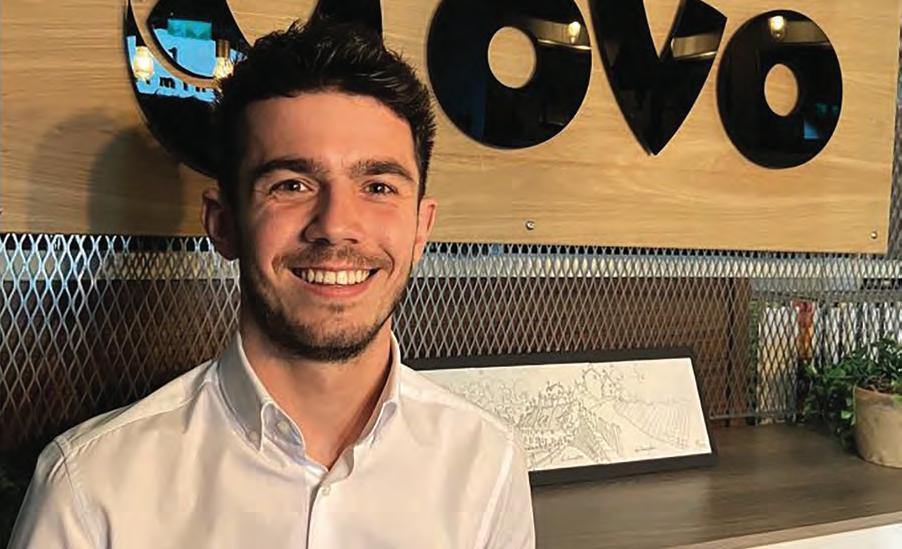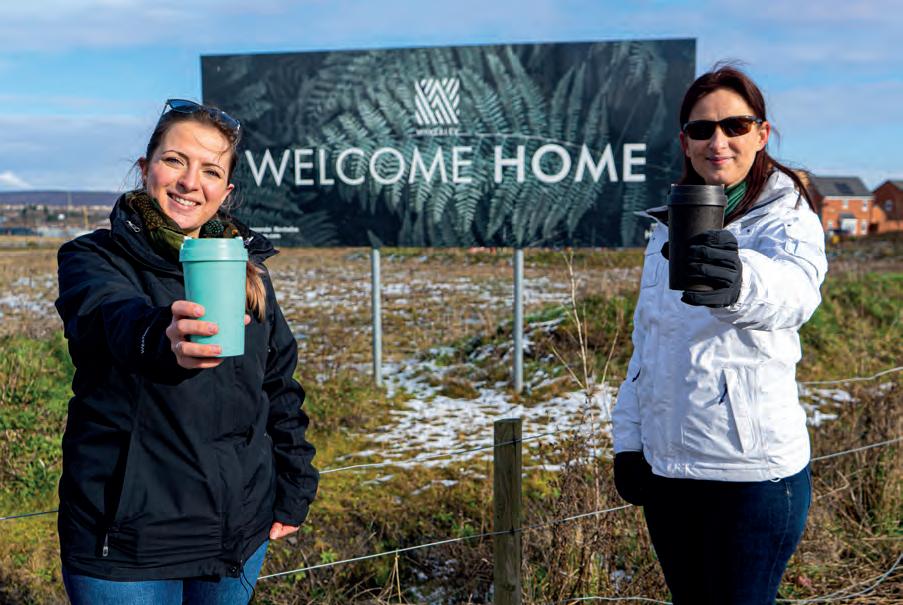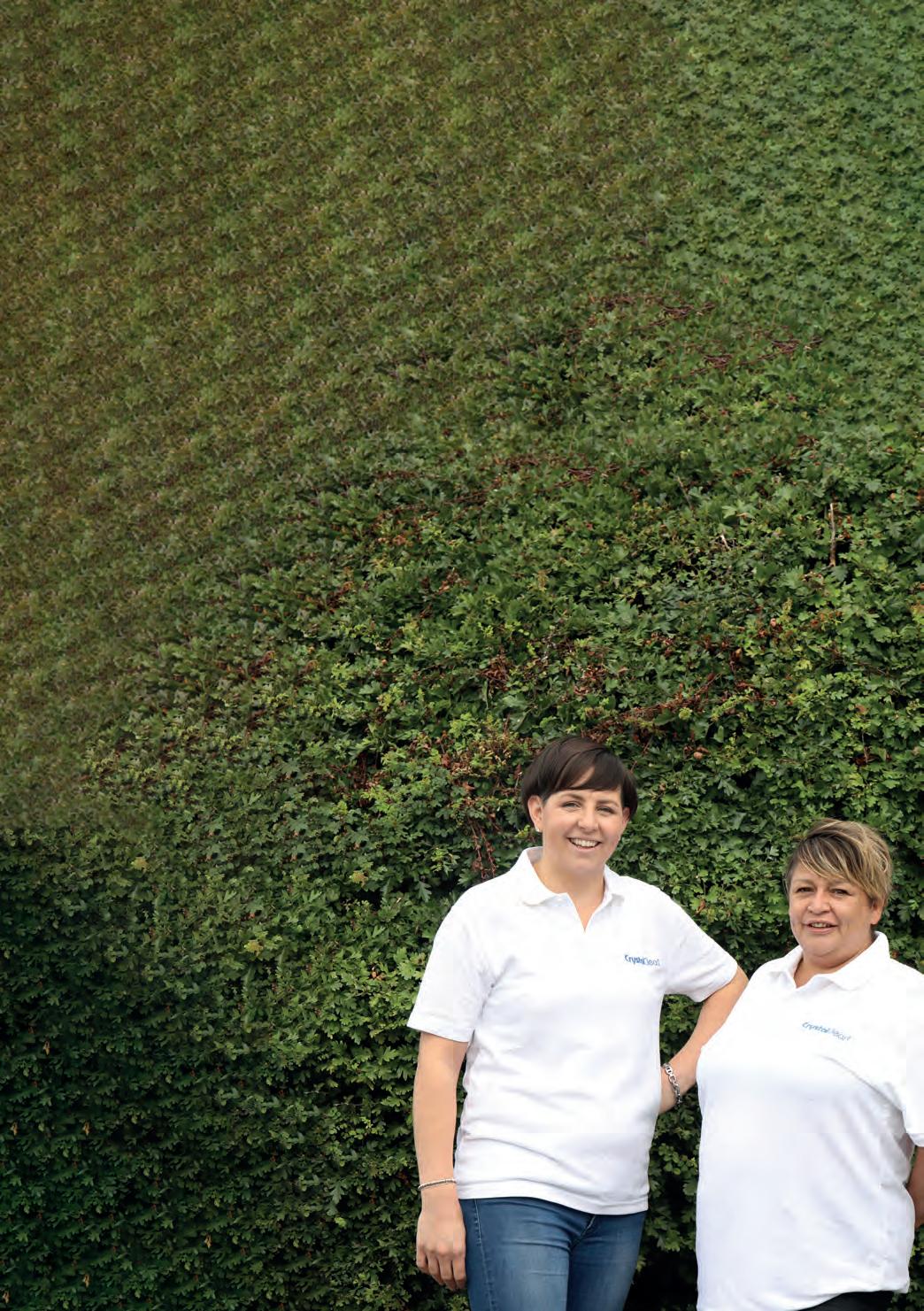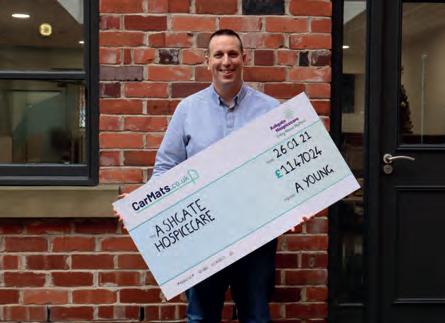
30 minute read
Barnsley College
MENTORING THE NEXT GENERATION OF BUSINESS LEADERS
Since the pandemic, Barnsley College has seen a record number of businesses launched by its students, with support from the iTrust initiative – here they share two success stories
Advertisement
The iTrust initiative is a joint venture between the College, Barnsley Chronicle and The Business Village which supports students interested in starting up a business. Students have access to an array of information and guidance, including mentoring from the College’s Enterprise team, The Prince’s Trust, industry specialists and local businesses from the College’s Talent United networking community. The scheme can also provide a start-up grant of up to £250.
Jess Widdowson, enterprise team leader at Barnsley College said: “The guidance and support are invaluable to our aspiring entrepreneurs as they get first-hand, practical advice from successful business leaders.
“Talent United partners can devote as little or as much time as they wish and there are some extremely worthwhile benefits associated with the scheme, not least the fulfilment gained from mentoring a young person and watching their business grow. The College continues to Transform Lives and help our students to fulfil their potential throughout this very difficult time.”
Megan Faith Art
Student Megan Timms turned her craft hobby into a career MEGAN TIMMS (LEFT) AND VICTORIA PRENDERGAST
when she launched her business, producing and selling products including jewellery, accessories and sculptures.
Studying Level 3 Digital Design at the College, Megan said: “During lockdown I started experimenting with polymer clay. I made a few pieces of jewellery and loved the process as it was fun to work on something that brought my art to life.
“I have always been interested in starting my own business but often thought I had to be older or didn’t have enough time. Lockdown was the perfect opportunity, and as I’d already designed my own branding in one of my units at College, it gave me confidence to build my brand and design all the elements that go with it.”
Megan invested an iTrust £250 grant in a machine enabling her to make new products. She has also launched an e-commerce website to showcase her products.
Victoria Prendergast
Victoria decided to turn her love of health and fitness into a full-time job after realising she could support her local community to get engaged in sports.
Ex-forces and now studying Coaching, Physical Education and Sports Development at Barnsley College, Victoria will open a bootcamp activity group to host a variety of fitness programmes, creating a safe environment which is accessible by all.
Victoria said: “I am a qualified personal trainer and have been helping local people to stay motivated to keep fit by joining them for runs. I’ve realised a lot of parents in my local area live such busy lives they lack the drive to keep fit and encourage their children to do the same. I see children spending time on devices and gaming, so they are missing out on really important time being sociable and active. I want to encourage an active lifestyle and make activities more accessible.”
Victoria has assisted a nutrition class at her local church which has given her fresh knowledge and skills to advise local people and is also studying a course to enable her to understand autism better and help create an entirely inclusive business. She intends to spend her iTrust £250 grant on insurance for a venue to host fitness classes, and also cover costs to ensure classes are COVID-secure.
Find out more about iTrust or the employer engagement initiatives offered by Barnsley College – visit www.barnsley. ac.uk/enterprise or email enterprise@barnsley.ac.uk
THE UBER RULING
– AND THE FUTURE FOR THE GIG ECONOMY
Following the recent Supreme Court ruling that Uber drivers are workers and not self-employed, Sara Ellison, chartered legal executive at Banner Jones, takes a look at why the case is important – and what it could mean for employers
On 20 February 2021, the Supreme Court handed down its judgment in the long-awaited Uber case (Uber BV and Others v Aslam and Others). All six judges unanimously ruled Uber drivers were workers, not self-employed contractors and as a result were entitled to basic employment rights like National Minimum Wage, holiday pay and sick pay.
Why is this case important for the gig economy?
In 2019, it was estimated by the TUC that more than 5 million people were employed in the gig economy and it would be fair to assume that this figure has risen because of the pandemic and the increased reliance on delivery drivers, for example. This illustrates the potential number of workers who will be looking at the Uber case and questioning their own employment status. For any employers relying on casual contracts it could mean an increased risk of expensive claims where the employment relationship is not clear.
In the UK there are currently three different types of employment status:
1Employees – they have the most employment rights and are afforded the most protection by employment law. While employees have more labour security, the employer has more control over when, where and how the work is carried out.
2Workers – they have more flexibility over how they work and some basic employment rights and protection, such as the right to be paid the National Minimum Wage, holiday pay and sick pay.
3
Self-employed/
contractors – they have very little employment law protection but should, in theory, have full control over the terms upon which they carry out their services (and the most symptomatic of the gig economy).
Simply labelling someone as a self-employed contractor does not make them selfemployed if, in reality, they are being treated as a worker or an employee with little selfcontrol of how they carry out their services. Uber has found this out to its detriment and, no doubt, at a huge cost when the Employment Tribunal determines how much compensation the Uber drivers should now be awarded.
The Uber judgment follows the recent review of the gig economy in the Governmentcommissioned Taylor Review, which resulted in the Good Work Plan that came into force in April 2020. The Plan aims to secure a better balance between flexibility and employment rights. Part of this protection is to ensure all workers are given a statement by their employer on the first day of their relationship, confirming their status and their terms and conditions for undertaking work.
Following the Uber judgment, and in line with the Good Work Plan, employers in all industries, not just the gig economy, should be ensuring their contracts are up to date and the right ‘label’ has been correctly applied to the relationship. Employers need to ensure the contract terms are provided on day one – this is now mandatory in all cases and could lead to claims for failure to provide them.
Many employers in all sectors have understandably been preoccupied with the pandemic since the Good Work Plan came into force, so now may be a good time for employers to review their contracts. Our team are here to help.

PODCAST SPOTLIGHT
This month we talk to the people behind Sheffield-based SEO agency Rise at Seven to find out how they have, well, risen so quickly! And producerJames Marriott turns the spotlight on Sheffield Digital, podcasting strategy – and the best kit to buy, too!
Rise at Seven
Carrie Rose and Stephen Kenwright set up Rise at Seven just over 18 months ago and have already grown to 60 plus members of staff and picked up major accounts including online retailers Missguided and Halfords.
Now with offices in London, and a newly announced one in Chicago, Carrie and Stephen tell us the story behind the firm’s meteoric success and what they have learned about operating a fast-growing startup during a pandemic.
Sheffield Digital
Sheffield Digital is a not-forprofit organisation which links all the area’s digital industries.
Some directors also do a cracking regular podcast exploring the issues facing businesses and freelancers around South Yorkshire.
Recently, they decided to take a short break from creating new episodes – giving you plenty of time to catch up with some of the 70 they’ve already produced. Episode 69 in December is a good starting place, looking back on a ‘unique’ year for the city’s digital community.
In short – you really should be putting time aside to work out your strategy for audio in 2021, otherwise you’re at serious risk of getting left behind.
And of course, if you need help creating or growing a podcast for your brand, get in touch: james@unltdbusiness. com
Podcasting Q&A: What’s the best podcast mic?
This is often the first question someone starting a podcast asks – I understand why. We all love buying a new toy!
But honestly, it’s better to hang on until you have properly nailed down your format and strategy. Once you know exactly WHAT your show is, you can pick the mic to match.
Right now, chances are you’re only going need something to record you, as everything is being done virtually. But in time, maybe you’ll be looking to do face-toface recordings – so get a mic to match.
I recommend USB microphones as they’re simple and cost-effective.
If you’re just recording yourself, you can’t go far wrong with the Rode NT-USB. It’s sturdy, sounds great, and is a bit of a looker to boot.
For something a bit more futureproof, the Blue Yeti has been around for years, but still stands out because of its four recording modes – it’s good for solo episodes but also for larger groups recording together.
If your budget is a bit higher, the mic I use is a Shure MV7. The sound is simply superb, and you’ll even get comments on how clear you are on things like Zoom calls.
Audio Strategy
Unless you’ve been completely hidden away this year, you’ve probably heard of Clubhouse.
You might not be so familiar with Twitter Spaces. And even less likely to have come across Facebook Audio Live.
The latter two are still in beta stages, but they all share something in common – audio-driven social media.
It’s pretty clear this year is a huge one for audio, with podcasting continuing to grow at a pace.
This brings us to Audio Strategy – basically a plan for how your business approaches these platforms and its overall ‘sound’.
It’s a bit complex to go into full details about here, but I did a 25-minute presentation all about it last month with the lovely folk at Sheffield DM which you can catch up with – just search on YouTube for ‘Sheffield DM #11’.
unLTD’s latest podcast episode is available through all your usual podcast providers – search ‘unLTD business’.

IF YOU ASK ME: ZOOMING IN
With networking events cancelled, many offices closed, and face-to-face meetings discouraged, video conferencing has slotted into our lives to connect us to our colleagues, clients and customers. While many of us have felt distant from the teams and people we have worked with, Zoom, Teams, Hangouts and FaceTime have been utilised in new ways to help keep us in touch.
unLTD’s Dan Laver shares his own experiences and learns how technology has enabled some local businesses not just to communicate between themselves but to reach out across the world and discover new ways of working that are here to stay.
unLTD HEAD OF SALES, DAN LAVER
I hate Zoom. There, I said it.
That’s not some strange brand loyalty to Google, Apple or Microsoft. Zoom is actually my software of choice, but I hate it in the same way that I hate my internet provider every time Netflix freezes during Rick & Morty and my washing machine, every time I overload it and it refuses to complete the spin cycle.
The truth is, that I resent Zoom. Overnight, about a year ago, much of what I love about my job got stripped away and I’m one of those people who has never settled in to ‘the new normal’. I want the old normal back, thanks and Zoom is my constant reminder that it isn’t here yet and might not be for some time.
Networking events were very much my bread and butter. I have often been chided by my peers as the guy who turns up at the opening of an envelope/door/jar of beetroot and it’s true that not only did I find them one of the best routes for meeting new potential customers, but I genuinely enjoyed them. Most of them, anyway. The ones that started at 6:30am were probably a bit too much.
That enjoyment never really came from being given the opportunity to sell my wares Dragons Den style for 90 seconds while we were waiting for the bacon butties, but from the chance to really get to know the people I was meeting. I miss really getting to know people. The catchups by the coffee jug where someone lets me know why the bloke in accounts got the hump with them and how they finally managed to close the deal that they’ve been working on for the last month or two.
I’ve met some great people on Zoom, I admit it. I’ve enjoyed quite a few of the events that I’ve attended, even if I’ve slightly regretted being quite so honest to Andy Hanselman when he asks me to rate how I’m feeling out of ten, forgetting over 30 people were listening to my rant! It’s also been very handy to sit in my conservatory and catch up with Sophie Conboy at Connect Yorkshire rather than driving to Leeds and the benefits of dressing formally above the waist only are an unexpected pleasure.
But I still loathe Zoom. And that’s because I miss everyone. And I hope that soon, we can meet up and gossip by the coffee jug while we wait for that bacon buttie.



STEFAN TOBLER, FOUNDER AND OTHER STORIES
As COVID-19 hit in 2020, we saw larger publishers becoming risk-averse (as they were ten years ago in the last recession), and so we had an opportunity to grow that was too good to miss.
For almost all our ten years of existence, we've published most of our books in the US as well as the UK, with separate sales and publicity campaigns in each territory. It's always a thrill when one has taken off and become a word-of-mouth and sales success through our work there. We put 'New York' on our books along with Sheffield (our home) and London (where we have a publicity outpost), but we kept active in the US mainly through a lot of transatlantic trips by me from Manchester airport. It was not great to head off for weeks and leave my wife to hold the fort alone with our little pre-schoolers, and it was certainly not playing our part to reduce carbon emissions.
In 2020 it became clear that no one is going to care if you actually rent some overpriced, underheated Brooklyn office space. As long you have a team of US-based staff, you have a US office. And if you have the right people, people take you seriously. In some ways, the post-COVID landscape is much more of a meritocracy and benefits businesses like ours who are not based in the mega-cities.
So, what did we do? We expanded our US office – quickly recruited three of the most respected people in the industry (in editorial, publicity and bookseller outreach), people who we'd heard had had the bad luck to fall foul of pandemic redundancies. And now that we are all used to working remotely, we could choose the best candidates, not the ones who happen to live in one location. Our US publicist lives in Brooklyn (handy, for sure), but our editor is in upstate New York and our outreach person in Chicago. By comparison, last year, we failed to recruit for a senior role in Sheffield because there are not yet many publishing folk here. In future, we may find it easier to recruit, if we are less set on the person relocating here. (Hard as it is to imagine anyone struggling to relocate!)
And what has our expanded US office meant? The industry considers us part of the US publishing community now. This is already growing sales in the US for us. And even once all the COVID restrictions pass, I'm not going to burn through carbon and money with the transatlantic flights. I know my US colleagues will do a great job and I can stay home.
We're also using the changes of 2020 to re-evaluate how worthwhile different projects have been and to cut anything that isn't adequately repaying our time and financial commitment. It's like a year-long spring clean, and actually, it feels great.
One thing is for sure though, we'll always be committed to growing our publishing work in Sheffield, away from the metropolitan centres. I wouldn't be anywhere else.
PHOTO: KARINA LAX

Project Delivery
Health, Safety & Compliance Estate Services





NISHA KOTECHA AND ALEX SWALLOW, SOCIAL GOOD SHEFFIELD
Social Good Sheffield is a meetup for people in the Sheffield area who are involved in social good in some way – perhaps they volunteer at, or work for, a charity, social enterprise or social business. Pre-pandemic, we used to meet at a city centre pub. Having online meetups has been a lovely way to keep our networks connected. It has lifted our collective spirits during this difficult time to hear inspiring stories of all the ways the Sheffield community has come together and made a difference.
The three biggest things we’ve learned about online meetups are:
1It is important to try to involve everyone as fully as possible. At our physical meetups, people could circulate and meet each other and come and go as they pleased. So for example, people could just introduce themselves as and when and if they only wanted to stay for a quick drink, that was fine. The dynamics of online are different, so we have introductions at the beginning and we try to get as many people talking as possible so everyone gets something out of it before they leave.
2Planning things out beforehand is more important when you are dealing with things online. For example, for in-person events we might be chatting to people and then we’ll go to order a drink at the bar and in that bit of time on our own we can think things like ‘Ah I must introduce X person to Y person’ or ‘I wonder if Z person is having a good time?’. With online meetups you are less likely to have those little breaks, so pre-planning helps.
3Online meetups do have their advantages and it is good to focus on those. It can be easier to get people together and it is much easier to share resources with the whole group. Focusing on the positive aspects of online, rather than having the constant feeling that we’d rather be in the pub (even if we sometimes miss it!) helps us all.


CHRIS WOOD BUSINESS DEVELOPMENT EXECUTIVE, OVO SPACES
Zoom, the platform unknown to so many in 2019, should look at creating an annual award for the most used phrase, and if so, the winner for 2020 would without a doubt be ‘you’re on mute’.
For me, Zoom is something I knew I had to get used to and learn about with me starting out in a new business development role for OVO Spaces in September 2020. I wanted to attend networking events and build relationships with businesses around the Sheffield City Region but with the country being in a pandemic I knew face-to-face wasn’t going to be possible, so remembering I wasn’t on mute when speaking and understanding virtual backgrounds instead of having my kitchen units or bedroom wardrobes on show it was.
Over the past five or six months I have attended many different networking events online across the South Yorkshire region which, if it wasn’t for online platforms such as Zoom, just wouldn’t have been able to go ahead. From a personal view, I can’t wait for the ‘old’ normality to come back and we can be back networking and having meetings face-toface, especially with us being in an industry where those conversations can benefit our company much more than being online.
Doing so much work online and asking for Zoom links instead of ‘which pub shall we go to for lunch’ actually made me think a few months ago ‘will people even recognise me on behalf of OVO when we get back face to face?’ Well, a few weeks ago this only went and happened as I’d bumped into someone in real life – at a social distance! – who I’d only ever met on Zoom and they said ‘Chris, you’re a lot taller than I thought from Zoom’.
The likes of Zoom and Teams and their platforms might not be everyone’s cup of tea, but I’ll always be grateful for them giving me the opportunity to meet many different people such as Dan Laver, businesses such as unLTD, becoming a part of networking groups that moved online such as 3D Connect with Andy Hanselman and Jill White, and I will still continue to do so until it’s safe for everyone to go back face-toface.
ANDY HANSELMAN
What do the following have in common? • £2,600 raised for Weston
Park Cancer Charity • Amazing insights from some of the region’s most successful leaders including
Arnie Singh of City Taxis,
Amanda Holmes of
Dransfield Properties, Dave
Capper of Westfield Health,
Julie Dalton of Gullivers
Valley, Marie Cooper of
CBE+ and Simon Biltcliffe of
Webmart. • Local young hero Captain
Tobias being donated a super tricycle for his fundraising adventures from a very generous local business, Jiraffe. • A new van for the wonderful charity Grimm & Co. • Insights into the revolutionary new tourist attraction, Gullivers at
Rother Valley • People signing up for online beer festivals inspired by entrepreneur Fraser
Doherty.
They were just some of the outcomes of our online 3D Connect events over the past year that have had lots of local business leaders learning together, exchanging ideas, suggestions, sharing and solving problems, supporting each other, and doing business together.
Yes, like all networking events, Zoom can have some vocal, hard sell, and, dare we say, opinionated people. It can also be a great source of stimulation, innovation, challenge, learning and fun – provided, of course, you attend the right events!
We’ve worked hard to ensure our 3D Connect events have done this by transferring what works well at our monthly face-to-face gatherings onto Zoom. That includes ‘participation’ (no two-minute pitches, but updates on how things are going and how people are feeling), sharing of ideas and experiences. As well as the names mentioned earlier, we’ve had some amazing insights from successful leaders from businesses such as 3 Squared, Airship, Jessica Flynn Design, HLM Architects, Glu Recruit, Razor, BHP, Bhayani HR, Resolve IT and SCCCC.
A real success factor has been the honesty of people sharing their challenges and issues as well as their successes. Other things people tell us they like? Interacting, having ‘fun’, whether that’s quizzes and the banter between participants, or making it focused and relevant, and keeping it ‘short and sweet’ – 9.00 am to 10.30am and then it’s back to work!
So, yes, our monthly 3D Connect Zoom sessions have been a real success story and we’ve had some fantastic experiences, even having treats delivered on one occasion by the City Grab team. But…we can’t wait to get to see everyone back face-to-face as soon as possible!


A NEW CHAPTER FOR SHEFFIELD BID
The pandemic has been tough on businesses, but with Sheffield voting in favour of another five years of BID, a vibrant (albeit different) future lies ahead according to BID deputy chair John Baddeley
It’s never been more important to support Sheffield’s city centre as it’s going through an incredibly difficult time, and I’m not just saying that from my role as part of the BID – but also from the perspective of a business itself as chair of Wake Smith Solicitors.
I think a lot of people often take the work BID does for granted, but without the BID things likely would have been a lot worse. Take our street cleaning service for example; without it who would get rid of the rubbish in doorways and clear away the graffiti left from the night before?
If that doesn’t happen soon our city becomes a much less desirable place to be, and that’s the last thing anyone wants as non-essential stores start to reopen.
We await further Government announcements on support for the High Street which may help to kickstart it.
Not that we’re expecting to see an immediate return to normality with footfall numbers where they were prior to the first lockdown, as it’s going to be very difficult to attract shoppers in particular offline.
The horse may have already bolted there but I think what people will come to the City Centre for is the experience and, when restrictions are fully lifted come June, I hope BID can continue to build on its legacy of supporting events that help to bring people into the centre. One of my past favourites was Santa’s Post Office. I went in one evening, straight after work, and it was really good to see families there and the looks on children’s faces as they sent their letters to and saw it on a journey across the wall to Santa.
The Bears of Sheffield should finally go ahead later this year, with BID acting as headline sponsor, after being delayed due to the pandemic. Families will take a tour of the city centre and tick off each bear as they go around on their app. We also hope to have an increased focus on making Fargate a more vibrant area, as it has arguably lost its crown as Sheffield’s premiere shopping street following extensive redevelopments of The Moor.
It’s going to be a case of looking at what we do with our city centres, and how we repurpose them.
For one we now have more people living in the area than ever, especially if you look at the number of students in apartments and flats who require restaurants, bars and other services.
That is what will fill the void left, in addition to which we need to encourage more independent businesses and smaller retailers to get involved as they offer something different.
It won’t perhaps fill the big space where major retailers like Topshop used to occupy, but with more diverse restaurants, cafes and entertainment to hold people we hope Sheffield city centre will remain a really vibrant place to be.
This is going to be a reinvention that will take some time, and in the end not all city centres will likely look the same anymore – but I for one am looking forward to having a unique ‘Sheffieldness’ about our city centre.

Find out more about Sheffield BID here: www.sheffieldbid.com
ECOPORIUM
The team at Ecoporium are currently crowdfunding to open a plastic-free coffee shop and re-fillery in Waverley. Here they share with unLTD their hopes to create a community hub and an educational resource – as well as providing a good cup of coffee!
ECOPORIUM BUSINESS PARTNERS ANNIKA CLIFTON (LEFT) AND SARAH BROWN

Tell us about your business – sell yourselves!
Hello, we are the Ecoporium! We are currently crowdfunding to open a new plastic-free coffee shop and re-fillery in Waverley. The Ecoporium will stock freshly baked bread and confectionary from a local baker as well as milk in refillable glass bottles from a local dairy. We will sell basic food items such as rice, flour and pasta as well as household cleaners and cosmetics – all plastic-free.
The coffee shop will only be using compostable coffee cups or customers’ own refillable cups. We will create a community hub that will signpost people to local resources and act as a meeting place. We will provide workshops, talks, and activities to bring like-minded people together to make friends while at the same time decreasing plastic waste in South Yorkshire in an enjoyable way!
While there are a few plastic-free shops in Sheffield, we would be the only one to be an educational resource as well as providing a good cup of coffee.
Who are your customers and how are you targeting them?
We are currently using social media to connect without customers. Our audience is young families – we hope to engage the whole family in plastic reduction. Our range of workshops will cover all ages and we hope to work with the local schools within the next year. We've had so much interest and support so far – we can't wait to open our doors!
How can people get in touch with you?
Email: info@ecoporium.co.uk Web: www.crowdfunder.co.uk/ ecoporium Facebook: www.facebook. com/Ecoporium.Waverley

EMPLOYMENT TRIBUNALS:
WHAT TYPE OF CLAIMS ARE LIKELY TO INCREASE?
Employment Tribunals are on the rise – and expected to continue as a result of the ongoing pandemic. Here the Taylor Bracewell team take a look at which type of claims are likely to increase over the next year
It is no surprise that claims to the Employment Tribunal have increased by 18 per cent, compared to the same quarter the previous year, for the period of April to June 2020, according to the Ministry of Justice quarterly statistics.
We predict that this figure will increase further over the coming months as a result of the ongoing COVID-19 pandemic and the winding up of the furlough scheme expected in April 2021.
What type of claims are likely to increase over the next year?
Whistleblowing
Most employers, without a doubt, will have dealt with a query relating to their obligations in some form or another. However, the COVID-19 pandemic has further complicated the law. Employers should be particularly wary of ‘furlough fraud’ and dealing with concerns about health and safety. This might include situations where an employee has refused to attend work out of fear of contracting the virus.
Discrimination
Discrimination is when an individual is put at a disadvantage because of a protected characteristic. The characteristics include disability, gender reassignment, pregnancy and maternity, race religion or belief.
This year, the UK’s attention has been firmly drawn towards equality for all with the #BlackLivesMatter and #MeToo movements, the consultation relating to mandatory ethnicity pay gap reporting, and the topical debate about if individuals should be forced to take the vaccine.
Discrimination claims are likely to surge and we encourage employers to consider discrimination when considering any type of decision-making.
Unfair dismissal
When the furlough scheme eventually comes to an end, it is highly likely that businesses across the UK will face the daunting prospect of making employees redundant. We predict that Employment Tribunals are likely to be inundated with these types of claims for the foreseeable future. Employers should plan for redundancy, ensuring that they have sufficient time to go through the necessary steps before terminating an employee’s contract.
Why is this important?
Employment Tribunal claims can be costly, stressful, and disruptive. More often than not, a lack of planning and knowledge of current employment law lead to an increase in disputes within the workplace.
While you cannot always prevent an Employment Tribunal claim being brought, employers can minimise the risk of facing a claim, and the damage if the worst happened, by obtaining upto-date legal advice as soon as possible.
For further information, please contact Harriet Gardner on 01302 965250 or by email at: harriet@taylorbracewell.co.uk
CLEANING UP –
WITH FLEXIBILITY AND VALUE
Over the past 12 months the team at Crystal Clean Service have helped businesses stay open with cleaning methods that meet government guidelines. With more businesses looking to re-open under the road to recovery they tell unLTD how they can offer flexibility in uncertain times
Over the past 12 months our teams have helped businesses to stay open with stringent and thorough cleaning methods that meet the government guidelines to ensure confidence to staff, visitors and customers.
Sarize Hill, the operations director for Crystal Clean Service, has been looking at ways to help more businesses over the next six months.
“The road to recovery announcement is very helpful in providing a time-frame for businesses to come out of lockdown, but we understand that many are still facing uncertainty and feel that now is not the time to be taking on long-term commitments.
“While some services are necessary for your business, we know you need to ensure that you are getting true value for money. COVID-19 has taught us all to look for the best value services that effectively meet the needs of our businesses, and we understand that anything that falls short of your expectations is not viable. So, to help support local businesses, we have introduced the ‘Crystal Clean Flexible Contracts’ for new clients who want to change or enhance their cleaning procedures. These options give business owners the freedom to adapt their service, either when their needs change or when the government restrictions are lifted.”
Fully Flexed
“Sign up to a regular cleaning service for up to six months under a rolling monthly agreement. As your business reopens you may need enhanced cleaning measures to ensure that you are meeting government guidance and providing a safe environment.
“We understand that if the new roadmap for the UK is successful then you may not need this service on an ongoing basis. 'Fully Flexed' enables you to sign up to a monthly package for up to six months that can be cancelled at any point during this period, with just 30 days’ notice.

B23
“Designed for those businesses who are looking for a regular, ongoing cleaning service but feel unsure about signing a 12-month contract. If you are looking for a reliable and professional cleaning service from a trustworthy supplier, we are now giving you a three-month trial option.
“On the ‘B23’ package you will get all the same high standards as every customer, but we are giving you reassurance that if you are not happy you can walk away without any tie-ins. We know that you’ll be 100 per cent confident with our service and standards and this is our way of providing you with a more flexible entry to working with a high-quality service provider.
“We look forward to supporting you and your teams on your road to recovery by making sure you have a clean and safe working environment. If either of these options are of interest to you or you would like to discuss any other cleaning services to help prepare for your return to work, then give us a call today.”
CRYSTAL CLEAN SERVICE FOUNDER, HAYLEY KOSEOGLU LEFT WITH OPERATIONS DIRECTOR, SARIZE HILL










